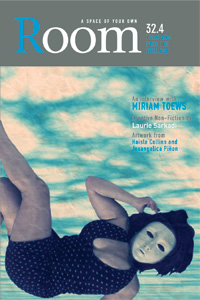Turn and Face the Strange | 32.4
2009
From the odd, the small, the life-altering to the inevitable, this issue explores facing the strange—facing change. Each piece touches on a facet of change, whether it expresses hope, paralysis, fear, or excited anticipation. For some, change is a wishful improvement of circumstance—to be better, to be more. For others, change is almost impossibility—a protagonist immobilized, stuck, afraid. Some drag their feet at change, go unwillingly forward to face changes not of their own making. And then still others make peace with change—accept their circumstances, agree and make do with the forces around them—those which they cannot control.
In this issue, the work is almost divided up into ‘chapters’, wherein the writing and art complement each other in small segments. We start with hope; Charlene Langfur’s poetry speaks to hopeful change, that we can be more than we are. Alex Pryce suggests that we are more than we seem, and Rebecca Rosenblum’s story similarly deals with confinement of identity—of voice. The dynamics of power and perception are also explored by Sharon Knauer.
Haisla Collins’ bold, but somewhat playful images are woven throughout, and to me, complement the different perspectives held in this issue. Josangelica Piñon’s striking imagery open up surreal perspectives and possibilities. Shayla Duval’s poem re-evaluates relationships right on the shelf, and dee Hobsbawn-Smith’s asks how past influences present. Love is almost a game in Becky Adnot Haynes’ story, but the winner is no longer clear. And the barebones of intimacy are all but stripped away in Hollay Ghadery’s piece of creative non-fiction, where personal limits are tested in the most intimate ways. Susi Wyss’ story takes a second look at true companionship, and Peggy Duffy’s sounds all too familiar, but turns a stereotypical power struggle on its head.
Much of the work also asks us to look at circumstance—who we are,where we come from, the limitations that are ingrained. And what we can overcome. Gillian Sze’s poem touches on how this can be accompanied with strength and grace, while Sarah Pinder’s looks at the subtlety of circumstance, or what’s below the surface. In Jane Finlayson’s story, with change comes fear— and the shifting dynamics of a relationship. And of course adolescence is filled with all kinds of change—whether ready or not. Ashley Little’s story speeds up the process.
In this issue, change, or turning to face the strange, also relates to psychological, internal struggles, and unique perspectives. We take a look atVan Gogh through the poetry of Stephanie McKenzie, then Picasso through the poetry of Rowena Priestley. The characters portrayed by Janet Amalia Weinberg are in a psychological battle of self-awareness and power, and Joan Baril’s characters blur the lines between fact and fiction.
In this issue we’ve also had the fortune of reaching out to the North—coming to us from the outskirts of Yellowknife is Laurie Sarkadi, who weaves a story of both personal connection and acceptance of her ailing mother, within the context of being connected to nature.
We’re also honoured to have had the opportunity to interview Miriam Toews. In her candid, honest words, she gives voice to how many of us who write face the struggle to get pen on paper, to find balance, and to face perhaps the toughest critic and most dynamic barrier to change of all—ourselves.
On behalf of the collective, I hope that as you digest these words and images, you pull from them inspiration or new perspective—to take them with you as you face your next challenge.

Price range: $10.00 through $21.00
Additional information
| Delivery | Canada, USA, International, Digital |
|---|
In this issue: Ashley Little, Stephanie McKenzie, Sarah Pinder, Josangelica Piñon, Rowena Priestley, Alex Pryce, Rebecca Rosenblum, Laurie Sarkadi, Gillian Sze, Miriam Toews, Janet Amalia Weinberg, Bronwen Welch, Susi Wyss